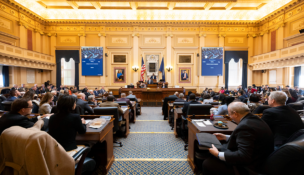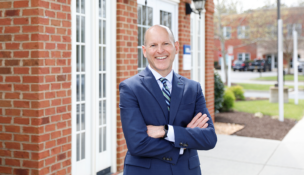Can everyone play nice?
November elections may force Democrats and Republicans to find common ground
Virginia Business //December 30, 2014//
Can everyone play nice?
November elections may force Democrats and Republicans to find common ground
Virginia Business //December 30, 2014//
Tommy Norment, majority leader of the Virginia Senate, compares life in the legislature last year to an amusement park ride. “It [was] an interesting year,” he says. “I feel like I’ve been to Busch Gardens and gotten on a roller coaster.”
Virginia’s political climate certainly has been on a wild ride. But with control of the legislature now settled, the pressure is on for the parties to get along with all seats up for grabs in the November 2015 elections.
After Democrat Ralph Northam won the lieutenant governorship and Democrats held onto the seats opened by his election and that of Attorney General Mark Herring, Democrats gained control of the evenly divided Senate, because the lieutenant governor has the tie-breaking vote.
Chairmanships and committee assignments changed. Leadership roles were reversed.
Fast forward to June. After a fierce, months-long standoff over Medicaid expansion, state Sen. Phillip Puckett, D-Russell, suddenly resigned. The move wrested control of the Senate from the Democrats, letting Republicans pass a budget and removing Gov. Terry McAuliffe’s bargaining chip in his push to expand Medicaid.
Accusations flew that Republicans had persuaded Puckett to resign with offers of a top job at the state’s Tobacco Commission. Puckett, who eventually removed himself from consideration from the position, had said he left so that his daughter’s judicial appointment could go through the legislature.
A special election in August cemented Republican’s control of the Senate, when Republican A. Benton “Ben” Chafin Jr. won Puckett’s old seat, giving Republicans a 21-19 majority.
Tensions over the controversy continued to flare. A federal investigation was launched, and news of unflattering phone calls emerged from Democrats, including U.S. Sen. Mark Warner, pleading with Puckett not to resign and making mention of other potential positions for Puckett’s daughter.
The federal investigation eventually ended in December with no charges being filed. The episode capped the end of a session that showcased a rocky start to the relationship between the governor and the legislature, particularly the House of Delegates.
After such a bruising battle over Medicaid expansion and the controversy surrounding Puckett’s resignation, can the Republican-dominated General Assembly and McAuliffe forge ahead and find common ground this year? There are indications they can on some issues.
No time for bickering
There won’t be much time to dwell on the past. Amid last year’s tensions, Virginia’s economic recovery sputtered because of federal spending cuts under sequestration. In September, the conviction of former Gov. Bob McDonnell on 11 federal corruption charges stunned Virginia’s politicians.
Quentin Kidd, professor of political science and director of the Wason Center for Public Policy at Christopher Newport University, contends
Democrats and Republicans both have an interest in working together this year so they have something to show to voters in November. All 140 delegates and senators will be up for re-election. “It will be a situation where both sides carefully dance around each other, trying to find that spot where they feel comfortable compromising because they want to take something to the voters and show what they’ve accomplished,” says Kidd.
Kidd also points out that Virginia’s political climate is normally less caustic than Washington, D.C.’s “I don’t think the level of partisan vitriol that we see in Congress is really there in Richmond,” says Kidd. “We saw that kind of politics erupt [last summer], but I don’t think the [politicians] are fundamentally that way.”
No budget battle?
After Puckett’s resignation, tensions didn’t have too much time to simmer.
By August it was clear that state revenues were coming in lower than predicted. Virginia faced an estimated $2.4 billion shortfall for the current 2014-2016 biennial budget. In September, McAuliffe and GOP leaders announced an agreement to make up most of the shortfall: the deal cut $192 million from state agencies, $90 million from higher education and $60 million in local government aid. The leaders also agreed to use $705 million from the state’s rainy day fund.
Del. S. Chris Jones, R-Suffolk, the chairman of the House Appropriations Committee, says Republicans have been working closely with Finance Secretary Ric Brown, McAuliffe and his chief of staff. “I think we’ve demonstrated that by being able to close the gap that we can work together,” says Jones. “That’s a good sign for January.”
Virginia has been especially affected by sequestration — which is supposed to be even more drastic in 2016 — because of the plethora of federal defense contractors in Northern Virginia and the significant number of massive military bases in Hampton Roads. George Mason University’s Center for Regional Analysis estimates that the federal government spent $13.4 billion less in the Washington, D.C. area in 2013 than it did in 2010.
This session, the General Assembly will need to come together to find another $322 million in budget cuts. McAuliffe made his budget amendment proposals in mid-December. They include $114 million in savings from cuts to tax breaks, including coal land and conservation credits. However, state Sen. Walter A. Stosch, R-Glen Allen, the chairman of the Senate Finance Committee, says a weak economy is not the time to raise taxes.
“When the economy is distressed, you don’t want to add more burden to the taxpayers…I think you’ll find a focus to do everything we can to get people back to work.”
The deal-closing fund
One key legislative battle could concern McAuliffe’s deal-closing fund. He plans to ask the legislature for an additional $10 million each year for the Governor’s Opportunity Fund, which offers incentives to companies considering investments in Virginia.
McAuliffe has brought home some major wins for Virginia — accounting for more than $5 billion in capital investment and 19,000 new jobs. But that success has come at a price. So far, McAuliffe has committed more than $68 million in state incentives. “We go [to the Governor’s Opportunity Fund] when we have big deals to close, so it’s not like we’re asking for money to sit there,” says McAuliffe.
Despite a tight budget session, Republicans are showing signs of support for increasing the fund. But they want a clear economic vision from the governor. “I think if he was to present an articulate argument showing, ‘This is the what I’ve been able to bring to Virginia in ways of increased tax base,’ there would be some receptiveness with accountability to putting more money in there,” says Norment.
Jones suggests lawmakers might be willing to allow McAuliffe to have more flexibility over how he uses economic development funds to free up more money for incentives. “We have indicated a willingness to work with him and ensure we are being very strategic and smart in how we utilize the taxpayers’ hard-earned dollars,” says Jones.
Democrats and Republicans also are likely to work together on improving Virginia’s workforce development. In December, the Joint Legislative Audit and Review Commission issued a scathing report on Virginia’s workforce development system, calling it inefficient and ineffective. It found that the commonwealth spends $340 million annually in federal and state dollars but only 16 percent of businesses seek help from government workforce programs to find employees. “I think this is an area that we can work on with the administration,” says Kirk Cox, R-Colonial Heights, the majority leader in the House of Delegates. “We’re not getting [a] $340 million bang for our buck, so I think this is going to be a huge issue.”
McAuliffe says he plans to make a push for better workforce development this session. “My whole workforce development initiative is taking the jobs that exist and the ones we think we’ll bring in, matching those and making sure we have the education so we’re building a skilled workforce,” says McAuliffe.
Ethics reform
Ethics reform is another area where legislators and the governor may find common ground. At the moment, both parties seem on the same trajectory.
In the wake of McDonnell’s indictment last year, the General Assembly passed a fairly weak ethics package. The legislation limited tangible gifts from a lobbyist or person seeking government contracts to $250 a year but left no limits on non-tangible gifts, such as tickets, meals, entertainment and travel. The new law also lowered disclosure requirements for many financial interests from $10,000 to $5,000.
The conviction of McDonnell and his wife brought ethics reform front and center again, with both legislators and the governor vowing to make major reforms in the 2015 session.
McAuliffe created an ethics panel that recommended expanding the $250 gift limit to include gifts of any type, including entertainment, travel and meals. It also recommended creating an ethics review commission with the authority to investigate potential wrongdoing and provide advice on ethics laws. The panel also wants to prohibit board and commission members from voting on issues when there is a conflict of interest, broadening the definition of family and including business associates.
Both the Republican leadership and McAuliffe want a tighter cap. “If you have a $100 gift ban, you never put yourself at risk of ever having any issues,” says McAuliffe. “Where you get in trouble is when you take gifts paid for by interests that are lobbying you. That should be outlawed.”
House Republicans said in December they would propose a $100 gift ban as part of their ethics reform package.
“The public really wants to see all those gifts covered. We’re going to need to be proactive,” says Cox. “We felt it was really essential to do ethics reform and rebuild the public’s trust.”
Some leverage for McAuliffe?
A related, but likely more contentious issue, is the redrawing of Virginia’s congressional lines. In a 2-1 ruling, judges from the U.S. District Court for the Eastern District of Virginia determined in October that Virginia’s congressional districts were unconstitutional because too many minorities were packed into the 3rd District, which stretches from Richmond to Norfolk. Republican congressmen have appealed the ruling to the U.S. Supreme Court.
McAuliffe, who has pushed for bipartisan redistricting, has said he wants districts that encourage voter turnout and are more competitive. He will have veto power over any new redistricting map drawn by the legislature if the appeal fails. If the legislature and governor can’t reach a consensus, then the court would redraw the lines. “I want fairly drawn lines,” says McAuliffe. “The Democrats only have three out of 11 congressional seats. Clearly this tells you that those are not fairly drawn.”
Could a Medicaid battle lead to a war?
A major impediment to cooperation this year could be how McAuliffe handles his push for Medicaid expansion, a contentious issue that dominated last year’s session. McAuliffe included Medicaid expansion in his proposed budget amendments in January.
It remains unclear, however, whether he will match his resolute efforts on the issue last year when an impasse brought Virginia to the brink of a state government shutdown.
Some Republicans have made it clear that another major push this year could sour relations.
“I would be hopeful that we would not revisit the Medicaid expansion issue only because I think it will just exacerbate relationships in a year when we need to try to move Virginia forward,” says Norment, the Senate majority leader. “This governor’s strength is marketing and salesmanship and being an energetic cheerleader for Virginia. If we could focus on that and bringing more businesses in…that would be a wonderful legacy.”
Medicaid expansion has been one of McAuliffe’s major initiatives, but Republicans in the House of Delegates remain adamantly opposed to expansion of the program.
“I think the question for Democrats and McAuliffe is how they continue to push Medicaid expansion without in some ways muddying the waters and making it difficult to work with the other side,” says Kidd of Christopher Newport University.
“The debate over Medicaid expansion partisanized so much in the last General Assembly, that if this session is more or less like the last one, the governor’s not going to get much accomplished and very few members of the General Assembly are going to go home with something to feel good about.”
-


















